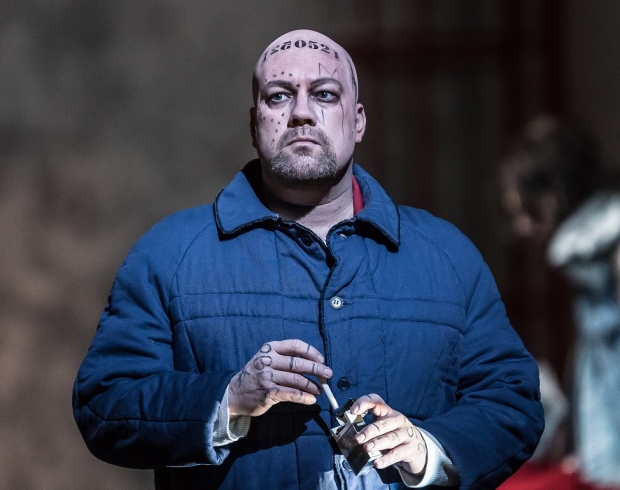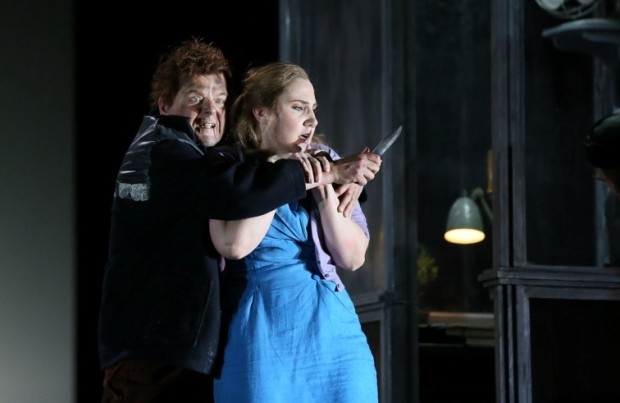Review: From the House of the Dead (Royal Opera House)

© Clive Barda
The clichés keep on coming in a production that ties idle weirdness to modish modernity. For Janáček’s final opera, here (somewhat disgracefully) receiving its first-ever staging by the Royal Opera, lighting designer Felice Ross plunders the company’s bottomless stash of neon strips and video designer Denis Guéguin smothers the overture in a recording of Michel Foucault at his most irritating, filmed philosophising à la française. There are masks, of course, and drag, and now and again movement director Claude Bardouil tacks on some poorly-integrated body-popping because why not. Audience sightlines? Pot luck I reckon, but empathy suggests you should avoid the sides.
All this is a shtick that’s earned Polish director Krzysztof Warlikowski a ton of work in France where such tropes are the norm. It is what he does – which means, by extension, that he’s delivered precisely what the Royal Opera’s suits were after when they hired him.
It surprises me to say it but they may have had a point.
From the House of the Dead is a gaol opera, a study in stir-craziness where inmates co-exist in a state of terminal helplessness, and it reeks of claustrophobia. David Pountney’s realistic period production for Welsh National Opera (triumphantly revived last year) had the advantage of limited scale; Warlikowski, on the other hand, has the Covent Garden stage to fill. He does so in ways that occasionally baffle but have a cumulative power.
'Sonic steroids to bulk up the impact'
For 95 uninterrupted minutes during which prisoners fight and tell stories and die, he creates a distressing portrait of damaged souls being contained within designer Małgorzata Szczęśniak’s brutalist cage. They are lost boys whose adult wiring has left their emotional development far behind, and they struggle to cope with their grown selves the way a novice might struggle to steer a tank. The opera’s relevance to our current crisis of masculinity is self-evident.
The nearest thing to a main character is the prisoner Šiškov (the powerful Johan Reuter, tattooed of face and visceral of voice) whose climactic monologue is an impotent howl of rage. He killed his wife in a crime passionnel, and his vow to visit the same treatment on her lover is thwarted because he discovers too late that the guilty man had been right next to him in prison all the time, albeit under an assumed name.
Elsewhere a plethora of talent from the UK and abroad populates Dostoyevsky’s bleak yet optimistic depiction of hope’s inextinguishable flicker. Willard White lends his golden bass to the luckiest of the prisoners, Gorjančikov, and Pascal Charbonneau impresses as the illiterate young Aljeja. Seasoned Janáček tenors John Graham-Hall and Peter Hoare steal their big moments while a third, Nicky Spence, dominates the first act as Nikita, a confused and volatile nerveball who compounds his guilt but is tortured with remorse. Spence’s voice is fast becoming a thing of wonder; the heights of dramatic tenordom await.
Those heights have already been reached by the evening’s conductor, Mark Wigglesworth, who propelled his reading of this exotic yet austere score with awesome command. His achievement here, as with his Jenůfa for ENO, was to make a large orchestra fizz with power even when the going got gentle. Then when Janáček unleashes his Sinfonietta-like screams of energy he had reserves in plenty: sonic steroids to bulk up the impact. It was a gut-wrenching, hard-boiled account – and, like the show itself, not for the faint-hearted.
From the House of the Dead runs in repertory at the Royal Opera House until 24 March.












